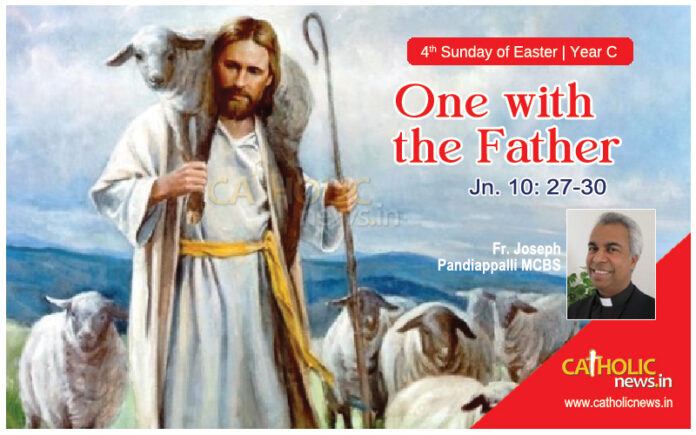
In today’s gospel Jesus explains the nature of the relationship between Jesus and the Father and his relationship to his people. When Jesus called himself as Good Shepherd, his listeners got an insight into the person and program of Jesus.
During the time of Jesus there were many shepherds and many flocks in Israel. The term “shepherd” was familiar to the people of Israel. In ancient Near Eastern, the term “shepherd” stood for rulers and gods. But neither the rulers nor the gods could always help people in their need. Jewish tradition also contained a concept of shepherds.
The book of Ezekiel, chapter 43, describes a shepherd who remains faithful to his people. In Psalm 23, God, Yahweh, is described as a shepherd who cares for his sheep. We read there: “The Lord is my shepherd; I shall not want. He makes me lie down in green pastures; he leads me to rest by the waters.”
This term “shepherd” from the Jewish tradition as Yahweh awakened hope and security in the listeners of Jesus. But when Jesus explained the concept of a good shepherd and referred to himself as the Good Shepherd, his listeners probably understood, as they do today, that Jesus meant much more than the term meant in both the ancient Near Eastern and in the Jewish traditions.
Jesus said that the good shepherd lays down his life for his sheep, but the hired servant abandons the sheep when the wolf comes. Like a good shepherd, Jesus laid down his life for humanity. Jesus said, “I know my own and my own knows me; the sheep listen to my voice.” These words demonstrate the friendship, love, deep relationship, and trust between Jesus and his people. The portrayal of Jesus as the good shepherd is very precise, intense, and personal. Jesus said: “I have given you an example, that you also should do as I have done to you.” (John 13:15)
Since ancient times, Christian tradition has referred to bishops and priests as shepherds. It is probably for this reason that Good Shepherd Sunday is celebrated as the World Day of Prayer for Vocations, and on this Sunday, prayers are especially offered for vocations.
When Jesus spoke about himself as the Good Shepherd, there was no hierarchy, no bishops, no priests, no spiritual vocations. There were only his listeners who wanted to follow him. When Jesus called himself the Good Shepherd and gave his listeners himself as an example, Jesus called all Christians to be good shepherds. This pastoral task belongs to every Christian in different ways. Everyone is called to be a good shepherd in those around them with hope, and love, with a service of self-giving, with faithfulness, courage, and joy. Jesus is our good shepherd. Jesus has also called us to be good shepherds.
Two days back on 8th May the good shepherd of the Catholic Church had been elected, Pope Leo XIV. His name was Robert Francis Prevost, born in Chicago, USA, many years a missionary in Peru, later bishop in Peru. From 2015 onwards he was bishop and from 2023 September onwards he was a cardinal. Let us try to be good shepherds like Jesus and pray for our Pope Leo XIV the good shepherd of the Catholic Church.
Fr Joseph Pandiappallil MCBS



